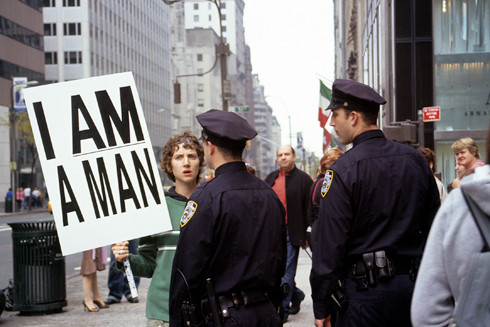Found In Translation
11 Feb - 01 May 2011
FOUND IN TRANSLATION
11 February – 1 May, 2011
In our globalized world, with political, economic, and cultural issues intertwined across nations, boundaries between the local and global have all but disintegrated. The necessity, and the difficulty, of communicating across cultural and historical divides is now an unavoidable aspect of our lives. Within this context, translation, in both its linguistic and more figurative senses, has become a fundamental tool for making sense of reality. Unlike ever before, we must consider what can be lost (or gained) in translation, and what effects these endless transformations have on the world around us.
Found in Translation brings together recent works by eleven artists who look to translation as both a model and a metaphor to critically comment on the past and to produce richly imagined possibilities for the present. For these artists, converting a text from one language to another exposes a discursive field in which the terms of identity—class, race, religion, sexuality—are negotiated, and meaning is generated. An apparently straightforward linguistic task therefore becomes a microcosm for the interaction between cultures, laden with power relations but also open to new aesthetic possibilities. Delving equally into history and fantasy, the works on view here investigate diverse political and social contexts; at their hearts, language continues to provide the crucial link between the cultures and temporalities they explore.
Because language is experienced in real time, Found in Translation concentrates on the time-based mediums of video, film, and 35 mm slide installation, which also allow artists to create immersive environments for their conceptual investigations. Acts of reading and speaking predominate: Patty Chang, Keren Cytter, and Lisa Oppenheim create cinematic reinterpretations of texts that feature or have been transformed by literal translations. Paul Chan, Brendan Fernandes, Sharon Hayes, Carlos Motta, Jenny Perlin, and Sharif Waked look to political history, reperforming and documenting written material from the past to approach issues of identity, protest, privacy, and free speech in the present. Omer Fast and Steve McQueen expand on these temporal displacements, using spoken language to disorient and reposition basic assumptions about contemporary society. Together these artists highlight ways that translation can illuminate the complex historical and political processes that govern life today.
11 February – 1 May, 2011
In our globalized world, with political, economic, and cultural issues intertwined across nations, boundaries between the local and global have all but disintegrated. The necessity, and the difficulty, of communicating across cultural and historical divides is now an unavoidable aspect of our lives. Within this context, translation, in both its linguistic and more figurative senses, has become a fundamental tool for making sense of reality. Unlike ever before, we must consider what can be lost (or gained) in translation, and what effects these endless transformations have on the world around us.
Found in Translation brings together recent works by eleven artists who look to translation as both a model and a metaphor to critically comment on the past and to produce richly imagined possibilities for the present. For these artists, converting a text from one language to another exposes a discursive field in which the terms of identity—class, race, religion, sexuality—are negotiated, and meaning is generated. An apparently straightforward linguistic task therefore becomes a microcosm for the interaction between cultures, laden with power relations but also open to new aesthetic possibilities. Delving equally into history and fantasy, the works on view here investigate diverse political and social contexts; at their hearts, language continues to provide the crucial link between the cultures and temporalities they explore.
Because language is experienced in real time, Found in Translation concentrates on the time-based mediums of video, film, and 35 mm slide installation, which also allow artists to create immersive environments for their conceptual investigations. Acts of reading and speaking predominate: Patty Chang, Keren Cytter, and Lisa Oppenheim create cinematic reinterpretations of texts that feature or have been transformed by literal translations. Paul Chan, Brendan Fernandes, Sharon Hayes, Carlos Motta, Jenny Perlin, and Sharif Waked look to political history, reperforming and documenting written material from the past to approach issues of identity, protest, privacy, and free speech in the present. Omer Fast and Steve McQueen expand on these temporal displacements, using spoken language to disorient and reposition basic assumptions about contemporary society. Together these artists highlight ways that translation can illuminate the complex historical and political processes that govern life today.

